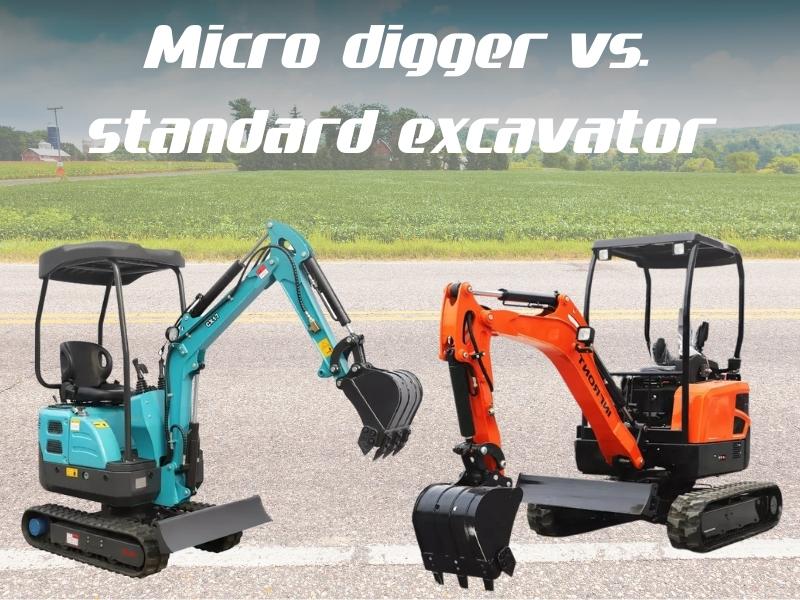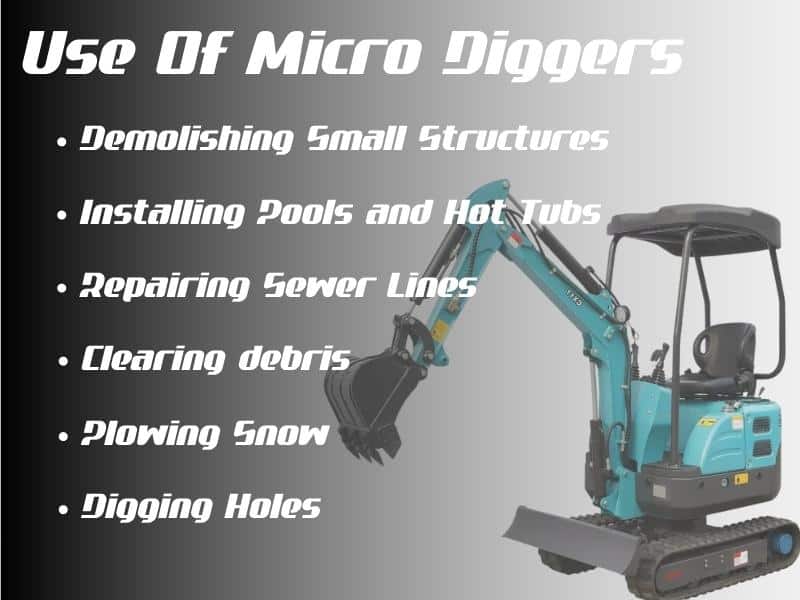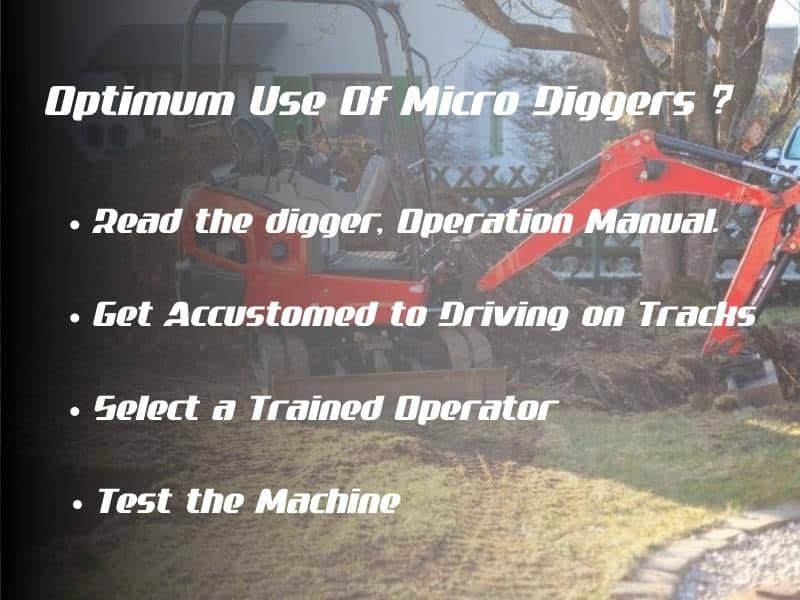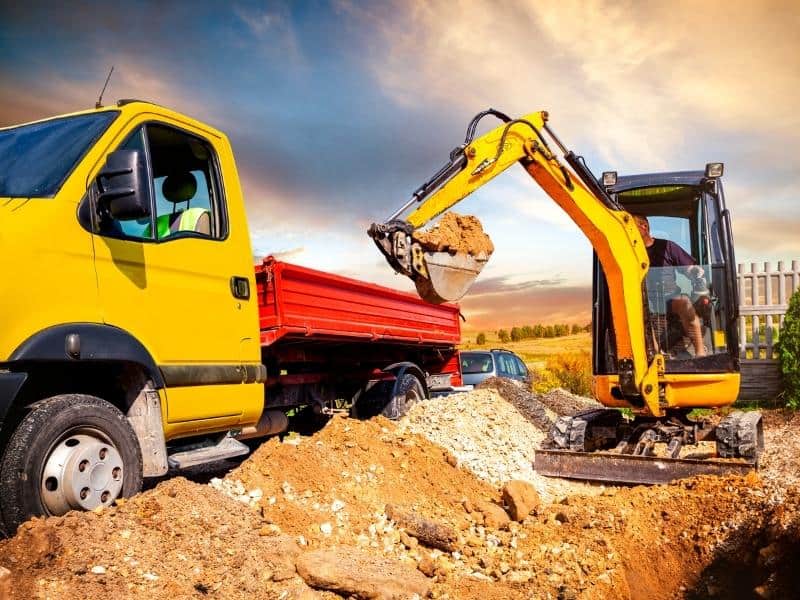Before briefing about “A complete guide on the application or use of micro diggers.” we should take a quick review of what is micro diggers. The mini digger is a popular addition to any construction equipment, and it also adds versatility to your work and is easy to apply. Start Mini excavators are considered toys by heavy equipment operators.
Still, after some time, when they were first introduced, they showed construction utility and on-site professionalism work with their ease of operation, small footprint, low cost, and precise operation. They make easy work of a weekend landscaping project. Now, micro diggers are popular machines because of their versatility in different construction jobs.
You can also find the right mini excavator manufacturer at the cheapest price. You can rent machines of different sizes and weights according to the tasks you need to complete. We can examples of when Use Of Micro Diggers are good idea for site work. Furthermore, it is also true that the application of every mini digger is suitable for every job.
What are micro diggers?
A micro digger is the same as a standard excavator; it is only small in size. They are available both tracked and wheeled with weigh up to 20,000 pounds. Any excavator that weighs more than it is generally considered a standard excavator, although some have less than 10,000 pounds. A mini digger’s bucket size falls between 12 and 24 inches.
Parts of the mini excavators
There are some of the main parts that use in micro diggers.
Cab: The operators of micro diggers sit in the cab and control the machine. The cab on the mini digger allows you for 360-degree rotation.
House: The house is connected to the undercarriage of the micro digger. It holds the digger engine and fuel cylinders.
Undercarriage: The undercarriage houses both the gears and the motor. You will also find the track roller that helps the digger move over the ground.
Attachments: There are many attachments used in micro diggers. Trenching buckets, grading buckets, rippers, and many more.
Boom: The boom is a long-hinged extension used to connect to the attachments.
Engine: The engine is the main part of the mini diggers, which gives power, helping to move the boom and the hydraulic tracks.
Micro digger vs. standard excavator


- Micro diggers are lighter and smaller, so they less damage the top ground because they are compact and easier to maneuver indoor areas or parking lots.
- A micro digger has a longer shelf life because it lifts less weight and carries smaller loads.
- Due to their smaller sizes, they are easier to maneuver because of their 360-degree rotation, which is ideal for working in narrow or cramped spaces.
- They are smaller in size, so they are very easy to transport. You can quickly and easily load and unload a mini digger onto a trailer or a truck.
- You can use Mini diggers for various projects because you can work with several attachments. With these attachments, you can do a wide range of functions in addition to digging and demolition.
Use Of Micro Diggers


Repairing Sewer Lines
Use Of Micro Diggers for repairing sewer lines is best opition. For sewer repairs is that micro excavators do the job at a lower price than the larger machines. With the use of micro diggers, you can maneuver tighter spaces to dig to the depth needed to get to the line. They make your work easy, efficient, and quick.
Installing Pools and Hot Tubs
The long arm on mini diggers provides the ability to work well in tight spaces. Because many Americans enjoy having a pool or large hot tub outside their homes. The compact nature of mini diggers makes them perfect for navigating a backyard that might not fit a larger digger. So it is the best piece of equipment to dig holes to install pools and hot tubs because of its mobility, flexibility, and efficiency.
Plowing Snow
In the snowy winter season city, workers need to clear roads covered. Use Of Micro Diggers can help you clear snow effortlessly with a special blade attachment. Their small digger allows you to move quickly in tight spaces and makes them perfect for snow clearing and safer roads. They are not as bulky as a traditional snow plow, so they easily clear out squished and hard-to-reach places, dig cars out of snow banks, and even can clear pathways.
Demolishing Small Structures
Several works out the call for the demolition of small structures like sheds. So the best option to effortlessly destroy any small structure is to Use Of Micro Diggers . These micro excavators fit this purpose because they can get around small areas efficiently and fit into tight spaces.
Digging Holes
Sometimes you have to dig holes in awkward areas of sites. A mini digger’s ability to move into difficult areas of sites makes it the ideal machine for digging holes in tough-reaching spots. Using micro diggers on smaller sites to dig holes can speed up projects, freeing up time to finish other important tasks.
Clearing debris
You can use clear, move, and pick up all sorts of debris with micro diggers. Use Of Micro Diggers can pick up, move, and clear all sorts of debris. They can also do wood remnants in a forest to disaster area clean up. They are a popular choice for debris clearing because of their elegant speed and quality to fit into small spaces safely.
Optimum Use Of Micro Diggers ?


Micro diggers have done many construction tasks safely and efficiently. We can do quick movement into awkward areas that can speed up many jobs.
Select a Trained Operator
The Use Of Micro Diggers is different in construction jobs, but untrained workers should not use mini diggers.
Read the digger, Operation Manual.
Always ensure you get the manufacturer’s instruction guide when renting or buying a mini digger. The manual contains detailed steps on using every control. You should check for warning labels on the machine yourself. The warnings tell you when not to use the machine. Also, Check the coolant levels and the engine lubricant before first use. You can reduce the chance of accidents when workers Use Of Micro Diggers take the time to become familiar with every new machine.
Test the Machine
After reading the digger Operation Manual, now time for you to use the excavator to test the machine. Mini diggers use a standard ignition with a digital keypad. Make sure that you are using your seat belt. Even though micro diggers don’t move at high speed, the seat belt protects you.
The ideal area for testing is a large, open area with a level surface. Go through all the controls and get a feel for the machine. Mini excavators are quite stable, but a level surface helps to decrease the risk of overturning the machine for inexperienced users.
Get Accustomed to Driving on Tracks
Most diggers use rubber tracks. These tracks are only for moving forward and backward. It would be best to move the machine using a limited range of wheel motion. The controls allow you to move the right and left tracks independently. You can control it by hand together, moving the machine forward and backward.
How to Operate Micro diggers:


1: When you climb on your digger, you know how to operate it and what job you have to do.
2: Put your seatbelt on, so you should not jump out of your seat
3: Close the door of the cabin.
4: Start the digger by turning on the key in the ignition.
5: Check the fuel levels.
6: Take the safety lock off.
7: The joystick on the left will control the swing of the mini excavator by moving it left or right. The joystick on the right will control the boom up and down and the bucket’s position to open or close.
8: Use the joystick to the left to move the digger’s stick. It will also move the dipper closer by moving the joystick forwards or backward.
9: You can also use the left joystick to swing the cab to the right and left.
10: To drive the excavator, make sure the blade is up, and then use the pedals on the floor to move the machine forward. The pedal controls the angle of the boom about the cab. Pressing it forwards or backward will move the boom to the right position. It works when digging in a tight area where you cannot swing the cab around.
Tips for application of China Micro diggers
Hixen is china mini digger brand which offer you High Quality with lowest Price.Many brands like Hixen provides an ultimate guide for small excavator purchases. You can know everything. Or you can contact us immediately for more information.
Before the start of the use of micro diggers
- Before setting your foot on the machine, it is a good idea to make a strategy and plan how to approach the work site and use of micro diggers. Because if you do not know your work actually before beginning, it can result in a waste of time and fuel.
- It would be best if you also kept your team informed of your plan so they could remain safely out of harm’s way.
- You should also ensure that you have the right-sized attachments to maximize efficiency.
- Before starting your work, test the small digger by running it on a level surface to ensure no balance issues.
- Before use of micro diggers, check the machine for any damage, such as leaking oil or track damage.
Safety tips:
- Read carefully the caution used for moving the arm close to the cab to avoid hitting the blade or tracks with the bucket.
- Always Make sure the excavator’s tracks rest horizontally on the ground. While mini diggers are stable machines, you do everything for your safety, the excavator, and those around you.
- Be careful when trenching that you are not operating too close to the edge, especially if the soil is soft and prone to cave-ins.
- Please pay attention to your surroundings, usually what we ignore, such as obstacles overhead. For this excavator, mirrors and cameras were made.
Efficiency tips:
- Complete and repeating the checking of the machine is essential to maximize its efficiency.
- When you start planning work, try to find ways to keep machine movement to a minimum.
- You can save time, but fewer hours, the strain on the machine, and even help reduce fuel costs.
- Grease your machine every day and check the performance of regular maintenance.
- Check the air filters every 10 hours and clear away debris every 50 hours.
- Utilize the auto-idle function, as this can help save fuel and prevent early wear on the machine.